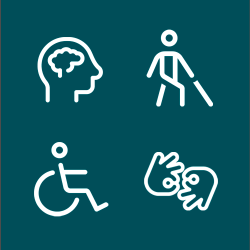Assignments & Exam
A student with a disability may experience times when their disability impacts their ability to complete assignments and tests at scheduled times. Similar to attendance, providing flexibility in deadlines and providing opportunities to make-up work are considered appropriate accommodations.
This accommodation is recommended when:
- An assignment was not listed on the syllabus initially and is given to students one week or less to complete.
- The assignment deadline is listed on the syllabus, but the student did not get the necessary information to complete it until there is one week or less to the deadline.
- An unexpected medical or physical episode interferes with the student’s ability to complete the work in the expected timeframe.
Guidelines
- The number of days given for each assignment or exam extension will depend on department, college, or accrediting agency policies, in addition to the interactive or participatory nature of a class. If special consideration in meeting deadlines is necessary, students must work with their instructor(s) to determine the maximum extension that can be given without compromising the integrity of the class or program.
- In general, assignments or exams given with more than one week to complete can be done successfully with proper management and planning and only warrant an accommodation when an unexpected disability-related episode occurs that prevents the student from following through, regardless of how much the student completed prior to that time.
- Unexpected illness or injury, recent diagnosis, or an onset or change in condition may warrant a withdrawal or incomplete from a course. In those cases, the institutional process should be followed.
- Students must factor in the reality of their own personal situation and use time effectively to complete assignments. Taking a heavy course load, having a job outside of school, or other family commitments do not justify allowing an accommodation even if they have a diagnosed disability that may otherwise support this accommodation.
- Some instructors allow all students in their class more time than they believe is needed for students to complete assignments and/or exams. For example, an instructor gives an assignment they believe should only take two days to complete but allows students three days. If all students in the class are provided an extended deadline, legal guidance suggests it would be discriminatory not to provide the extended time in addition to the time given to all students in the course.
Considerations
The following should be taken into consideration when modifying deadlines to accommodate a student:
- What is the purpose of the assignment? Is it necessary to have the assignment completed before an exam or discussion?
- What does the syllabus say about deadlines?
- Are students required to actively participate in class discussions/activities? How is participation figured into the final grade?
- How are students expected to interact with each other in class, with group work outside of class, or via Canvas or e-mail?
- Is the material being learned in the class sequentially? Does each week’s material build on the material learned in the previous week(s)?
- Are there other lab or class sections the student could attend to catch up on missed material?
- What general policies exist for making up missed exams, pop quizzes? Turning in late work?
- Could missed assignments be turned in via discussion board or e-mail?
- Are exams to be taken at a specific time and place, or is there a window when the exam can be taken?
- Is it possible for students to work ahead in this class?
When listed on the letter of accommodation, class instructors are asked to consider whether or not such an accommodation would be reasonable for the class and the assignment(s) in question. It is recommended that the student receive 1 – 2 additional days, at most, as an accommodation when reasonable.
Final Decision
Points to consider in making a final decision include:
- Assess the average time all students are expected to spend on the project relative to the deadline and if the disability situation necessitates an extension beyond this deadline.
- Consider if it feasible to assign the project to the student with the disability in advance of other students while keeping the deadline consistent.
- Accommodation that become a fundamental alteration to the class do not have to be implemented.
Instructors with questions on how to best incorporate accommodations into a class or who do not believe an assignment extension is reasonable may consult with Student Disability Services prior to making a final decision.

